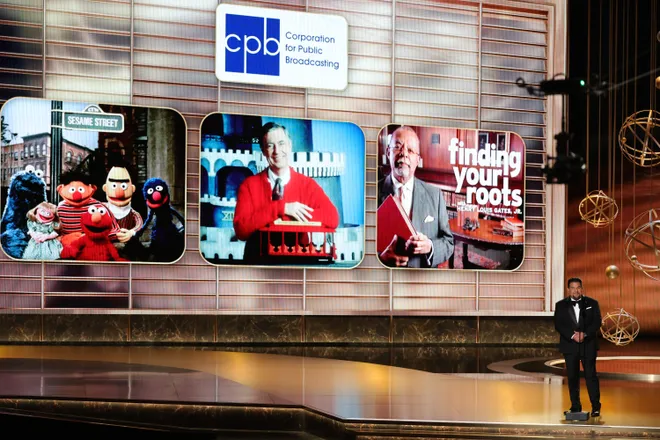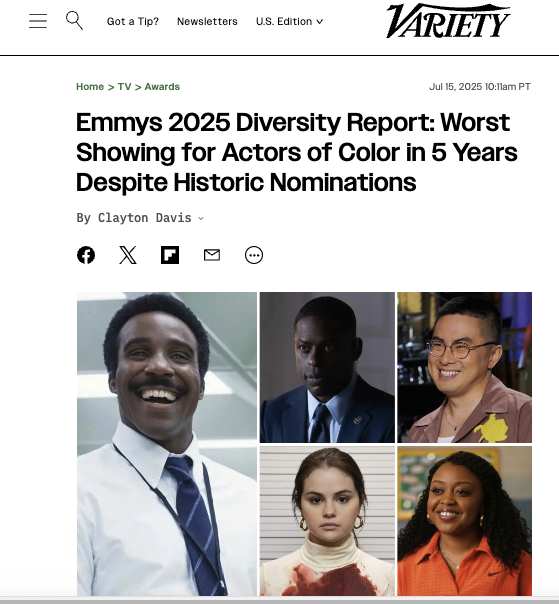Could this be a sign of terrible trends to come, given the current war on diversity and inclusion policies?
Watching the Emmys last night as Adolescence star Stephen Graham noted his mixed-race heritage – though he’s talked about it before, I had no idea his dad was Jamaican and Swedish – I had another sad epiphany.
Ethnic and racial diversity was nearly absent from this year’s winners on the TV broadcast.
By my count, Graham and Severance co-star Tramell Tillman were the only non-white winners featured in Sunday’s broadcast. That’s quite a turnaround from last year, when winners like The Bear’s Liza Colon-Zayas, Lamorne Morris from Fargo and Anna Sawai, Hiroyuki Sanada, and Frederick E.O. Toye from Shogun landed in the winners’ circle.
It’s especially disheartening news, given CBS’ announcement that the awards show drew 7.4 million viewers, up 8 percent from last year, providing a huge audience for a disappointing result. I talked a bit about my disappointment in a conversation with Ari Shapiro on NPR; listen here.
In truth, given how Emmy voters cluster their attention around select favorites in recent years, the success of just one or two shows featuring non-white casts can tip the scales considerably. Before Shogun, series like ABC’s Abbott Elementary, Netflix’s Beef and FX’s Reservation Dogs made a huge difference in the diversity of nominees and possible winners.
This year, Saturday Night Live star Bowen Yang was the only Asian acting performer nominated. Tillman became the first Black man to win an Emmy as best supporting actor in a drama – how in the world can that be true in 2025? – and the feat wasn’t remarked upon in his acceptance speech or by announcers during the broadcast.
In truth, the Emmys felt like a schizophrenic affair from the beginning. CBS seemed to craft a production aimed at appealing to non-Hollywood, MAGA-friendly sensibilities, with amiable Nashville-born comic Nate Bargatze as host, Knoxville standup success Leanne Morgan presenting and high profile moments for country stars like Vince Gill and Reba McEntire. Winners mostly avoided political speeches, even as the Trump administration is exerting unprecedented influence over cultural institutions like the Kennedy Center and the Smithsonian.

But the TV academy handed a major honor, its Governor’s award, to the Corporation for Public Broadcasting after Trump demanded and Congress acted to defund it. And they also handed awards to Ted Danson and Mary Steenbergen for theior acttivism, though neither of them said anything particularly political during the show.
There were a lot of Black people nominated for awards this year, from Uzo Aduba, Ayo Edebiri and Quinta Brunson as best actress in a comedy series, to Sterling K. Brown, Brian Tyree Henry and Natasha Rockwell in drama and limited series categories. But since Emmy voters’ attention seems to have shifted from shows like Abbott Elementary, The Bear and The White Lotus, nominees from those series got left out this year in major categories.

(Even the diversity of Emmy nominations was down this year, as this Variety story from july noted.)
This may sound like nettlesome nitpicking to some. But I remember what it was like, not that many years ago, when ethnic diversity among Emmy winners and nominees was rare. And given the visible statements by companies like CBS owner Paramount walking away from diversity and inclusion programs, it feels like the bad old days of exclusion and limited numbers of non-white people in the competition at all could be right around the corner.
Why does that matter? As I explain to my classes at Washington and Lee University, diversity in the arts teaches us how to dream – how to imagine a future where women or non-white people can hold the highest offices in the land. It also shows the industry there can be concrete benefits from centering non-white performers in high-quality projects.
And at a time when a few high-quality projects can swing the diversity needle higher, it’s obvious that it doesn’t take much to send those numbers crashing to earth, with devastating consequences.